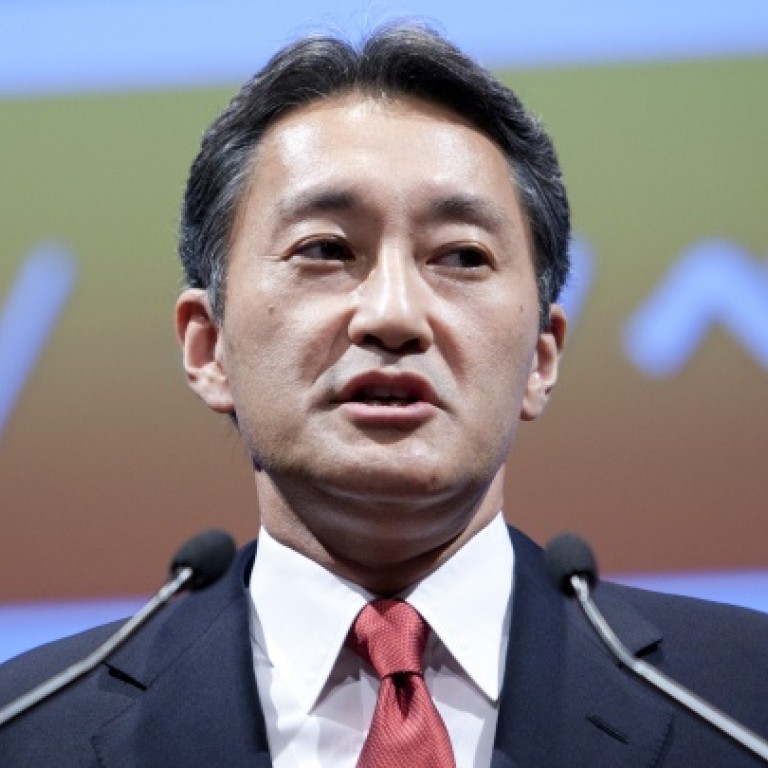
Why plunging yen is bad news for Japan Inc's health
The currency's fall boosts exports and allows nation's firms to avoid the need for reinvention
The smile on Kazuo Hirai's face shows why the yen's drop below 100 to the US dollar is as much a curse for Japan as a blessing.
The Sony chief executive is beaming because his company has produced its first profit in years. Did the troubled giant that redefined consumer electronics with the transistor radio and then the Walkman dream up a new gadget better than Apple's iPhone, iPad or iPod? No. Has Sony raised productivity or halted dangerous infighting between departments? Nope. Is the firm cutting costs and staff quickly enough to compete in a rapidly changing marketplace? Hardly.
No, Sony's 43 billion yen (HK$3.26 billion) profit for the fiscal year ended March 31 largely grew out of one thing: the yen's more than 20 per cent plunge against the US dollar since November. The problem is that the swooning currency - which has made Sony's PlayStations and Blu-ray players far cheaper for customers abroad - is taking the onus off Hirai and the rest of Japan Inc to claw their way back through innovation and improved efficiency.
That is one of three reasons why Prime Minister Shinzo Abe's much-hailed success at debasing the yen is not the godsend that executives and investors seem to think. The other two: Japan's growing appetite for energy imports, and the steadily increasing likelihood of a currency war.
Perhaps no company is more emblematic of Japan Inc's need to reinvent itself than the one Akio Morita and Masaru Ibuka founded amid the rubble of 1946. What many Americans feel about Henry Ford or Steve Jobs, Japanese think of Sony's founders. Their success was a cornerstone of Japan's post-second world war resurgence. Then Sony lost its way. The transition from rapid expansion and ballooning profits to stable growth proved difficult. In the years after Japan's 1980s asset bubble burst, Sony found itself bloated, sitting on too much debt and devoid of the creative spirit that once revolutionised industries. Today, Sony exemplifies Japan's plight - pressed on all sides by rising, nimble and low-cost rivals.
Like his predecessor Howard Stringer, Hirai spends much of his time working to streamline the firm, and the rest praying for a weaker yen. Now that Abe has delivered the latter, will Hirai forget why Sony became an also-ran compared with rivals such as Samsung Electronics and Apple? Sony's problem has never been the yen. The problem is that other than the occasional blockbuster movie, the firm no longer makes things that consumers want.
German exporters don't bellyache about exchange rates; they adapt, innovate and continue to make money. Japan has never learned that lesson - and it's not likely to do so this time. There's a real risk that companies like Sharp and Nissan Motor will see the weakening yen as an all-clear sign to stop reinventing themselves and thinking up new technologies and products. The moment Japan Inc collectively does that, "Abenomics" will become more of a threat to the future than a revitalisation plan.
Second, Japan is now importing more energy than it has in decades. Ever since the March 2011 earthquake and radiation crisis in Fukushima, nuclear power is out of favour. With all but two of its 54 reactors now offline, resource-starved Japan has to buy more and more oil, coal and gas from overseas.
This month, Abe and a delegation of Japanese business leaders went overseas to seek out energy bargains. No matter how cheap the deal, though, today's yen buys a lot less than before.
Consider the dilemma facing exporters, too. Fujitsu plans to raise domestic computer prices as the yen's fall boosts the cost of importing components. Toshiba says it may do the same. How are firms like Panasonic that moved production to China going to add jobs in Japan to help Abenomics along? It will be enough of a challenge to sell to Japanese, whose purchasing power is waning.
